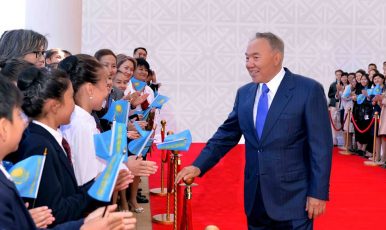 Wednesday, Central Asia watchers were all atwitter over a surprising announcement by Kazakhstan’s long-time president, Nursultan Nazarbayev, that he would aim to devolve some of his powers to Parliament.
Wednesday, Central Asia watchers were all atwitter over a surprising announcement by Kazakhstan’s long-time president, Nursultan Nazarbayev, that he would aim to devolve some of his powers to Parliament.
In December, a working group began meeting in Astana to evaluate the redistribution of powers between government branches, Nazarbayev’s announcement and the draft of proposed constitutional reforms now up for public discussion are products of that process.
In his televised remarks on January 25, Nazarbayev laid out plans for government reforms and constitutional changes. But first, he laid out a defense of Kazakhstan’s to-date autocratic version of a democratic system. According to the Astana Times’ transcript, Nazarbayev defended the country’s strong presidential system as “necessary... in the course of overcoming the enormous difficulties of state formation.”
“This principle justified itself,” he went on. “All our achievements were accomplished precisely under this system.”
But, Nazarbayev said, “the world is changing before our very eyes.”
The “essence” of the proposed reforms, he said, “is a serious redistribution of power, democratization of the political system as a whole.”
Nazarbayev described the president’s role in this new system he envisions as that of “supreme arbiter” concerned with “strategic functions,” foreign policy and national security. He broke reforms into two areas in his remarks, highlighting plans to transfer “a significant part of powers in regulation of social and economic processes” from the president to government. He indicated a shift of responsibility to government, ministries, and regions.
The second area — “a more difficult task” — entails a rebalance of powers between government branches. He seems to describe a parliamentary system, in which the “winning party in the parliamentary election will have a decisive influence on the formation of the government” and thus “strengthen the control of the legislature over the executive branch of power.”
These and other proposed shifts and rebalances, Nazarbayev said, would “help solve three problems,” namely, ensuring long-term stability, increasing government effectiveness, and develop a modern system of government.
“[T]here is no universal model of government in the world. We are all in search of it,” Nazarbayev said. He continued on to claim Kazakhstan had “never engaged in copying foreign models of government” and would continue to pursue its own Kazakh solutions. “The answer is clear and consistent: we will move in the direction of democratic development.”
All this is well and good, but what does it all mean and what exactly will the impacts of Nazarbayev’s grand reorganization be?
One major hurdle to democratic development in Kazakhstan is the absence of political plurality. Kazakhstan’s legislative bodies — the Majilis and the Senate — are dominated by Nazarbayev’s party, Nur Otan. Of the 98 elected seats in the Majilis, Nur Otan won 84 in last January’s parliamentary polls. The 47-member Senate includes 15 members who are directly appointed by the president, including his daughter Dariga. And presidential appointments don’t stop there; regional governors, as well as the mayors of Astana and Almaty, are appointed.
So while Nazarbayev’s proposed devolution of the presidency’s powers may increase the number of personalities involved in important government functions, all those likely to be empowered are after a fashion still under the influence of Nazarbayev, who will retain veto power over most government decisions.
In the end, Nazarbayev will indeed remain the “supreme arbiter” of the Kazakh state.
As many regional analysts have noted, the flurry of government shifts and proposed reforms seems very much aimed at the inevitable transition of power from Nazarbayev to someone else. Nazarbayev, following the death last fall of Uzbekistan’s Islam Karimov, is the region’s last remaining Soviet-era leader.
Thediplomat.com, 27.01.2017




